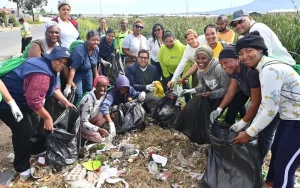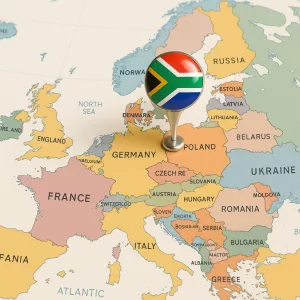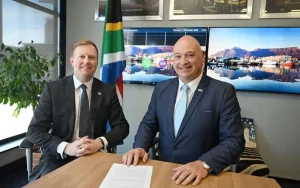The Garden Route, once a sleepy coastal area, has exploded into South Africa’s hottest property market. Highearning professionals, working remotely, have flocked there, changing the area from a quiet place to a bustling hub. This shift brought big money, new jobs in tech, and cool, green ways of living. Now, it’s a vibrant, futurefocused place where nature meets modern life.
Cape Town is trying to fix its broken train system, which stopped working in 2021. The city wants to take over the train lines, buy new trains, and make the stations better. They hope to have 240,000 people riding trains every day in three years and 600,000 in seven years. This big plan will cost a lot of money, and there are many challenges like money, legal stuff, and dealing with taxi drivers and workers. The next few months will decide if Cape Town can make its trains run again.
Uber Eats has completely changed how South Africans eat, becoming a daily habit for many. It’s more than just ordering food; it’s a part of social life, creating new ways to get meals, from ghost kitchens to quick grocery runs. This app has saved people millions of hours and has had a huge impact on the country’s money and society.
South Africa is ditching its old TV license for a new, smarter way to fund public media by 2027. Instead of paying for a TV, everyone will pay a small, regular amount, like a household bill, collected by SARS. This change aims to give the SABC steady money to keep telling our stories and sharing news, even if we watch on phones or computers. It’s a big leap from dusty old TVs to the modern streaming world, making sure public broadcasting stays alive and well for everyone.
Cape Town has a cool secret! A microgrant program helps local people fix water problems in their neighborhoods. Groups can get money, from a little to a lot, to clean rivers, stop trash from blocking pipes, or make water cleaner. They have to finish their projects quickly and show how they made things better. This awesome program is turning everyday folks into water heroes, making Cape Town’s water healthier for everyone!
Mr Price, a South African company, just bought a German discount store called NKD for a lot of money. They did this to get into Europe and make money in a stronger currency. NKD is a smart, smallstore business with no debt, selling clothes for families.
The 2025 Cape Land Flip: How One Signature Is Redrawing Parliament, the CBD and the City’s Wallet
Cape Town is doing a supersmart land swap in 2025! They’re trading a small piece of land near Parliament for a much bigger, valuable area, including the old Good Hope Centre. This big deal, worth R1.4 billion, is all about making Parliament safer, fixing up the city, and building homes people can afford. No money changes hands; it’s a clever trade of land for land, setting the stage for big changes and building projects in the city for years to come. It’s a bold move that could totally redraw the city’s future, one piece of land at a time.
Cape Town is doing something amazing! They’re getting rid of plastic trash from their government offices. They’re using a special “trafficlight” system to stop buying things like plastic bottles and cups. Instead, they’re finding clever, earthfriendly items, even pens that grow flowers! This smart plan is saving money and making their city much cleaner and greener, showing everyone how to fix a big problem.
Breakfast in Nairobi: How 54 Ministers Turned a Pastry Table into a War-Room for Africa’s Climate Ledger
African ministers met for breakfast, but it was no ordinary meal. They turned a simple pastry table into a warroom, fighting for Africa’s climate future. They need a lot more money for climate projects, about $50 billion each year. The ministers found $27 billion worth of projects that are ready to go, like green bonds and special funds. These projects aim to fix big problems like floods and droughts, proving that climate action is also about saving money and lives, not just the planet.
Cape Town keeps its streets bright with a clever, hidden system costing R2.3 billion! A team of 18 people watches over 190,000 streetlights like a giant video game. They use smart computer programs to send out repair crews super fast. They even invented “unstealable” lights and give rewards to citizens who report problems, making sure most lights are always on, even with sneaky thieves around.
South Africa’s Fragile 0,5 % Uptick: a Quarter of Tiny Gains, Big Fault-Lines and Policy Cliff-Edges
South Africa’s economy is taking baby steps forward, growing just a tiny bit by 0.5%. This small gain comes from tourists, mining, and new government jobs. But people are spending money they don’t have, piling up debt. The country still faces big problems like shaky electricity, unpredictable weather, and a growing money crunch. It’s like the economy is out of the hospital but still needs help to get truly strong.
Cape Town’s old Supreme Court Annex, built in 1897, is becoming Africa’s very first ‘livingart’ hotel called The Lenox. This amazing place mixes history with fresh art, letting guests see artists at work and enjoy cool exhibitions. Imagine sleeping where verdicts were made and having art all around you! It’s a truly special spot where old stories meet new creativity, making it a vibrant cultural hub.
Cape Town’s Quiet December: How a Handful of Virtual Votes Re-Draw South Africa’s Rands and Cents
Even though it’s December and many are on holiday, South Africa’s Parliament is still hard at work in Cape Town. A small group of people virtually decides how billions of rand will be shared between provinces and cities. This is called DORA, and it’s super important because it’s the last chance to move money around for things like hospitals and schools. They argue a lot over who gets what, because every rand counts, and they have to finish before a deadline.
Cape Town’s fancy houses are selling like hotcakes! Rich people can work from anywhere now, so they’re moving to beautiful Cape Town. Foreigners love the good exchange rate, making homes a steal for them. There’s also not much empty land left, and the city has better water and power. This makes Cape Town a super popular place for luxury living, with prices going way up!
Somerset Mall was like a smart detective, figuring out where local shoppers were spending their money outside the town. They found out a huge R1.8billion was leaving! So, the mall got clever. They brought in all the popular stores people wanted, made it super easy and fun to walk around, and even added special touches like gear for local adventures and cool tech for kids. They also cared for the planet and helped their community, making the mall a vibrant heart of the town.
The US and South Africa are in a big fight over trade! South Africa might lose its special trade perks, which means its cars and farm goods could get hit with huge taxes. This all started because the US didn’t like South Africa’s friendship with Russia. Thousands of jobs are on the line, and the future of South Africa’s economy hangs in the balance.
















